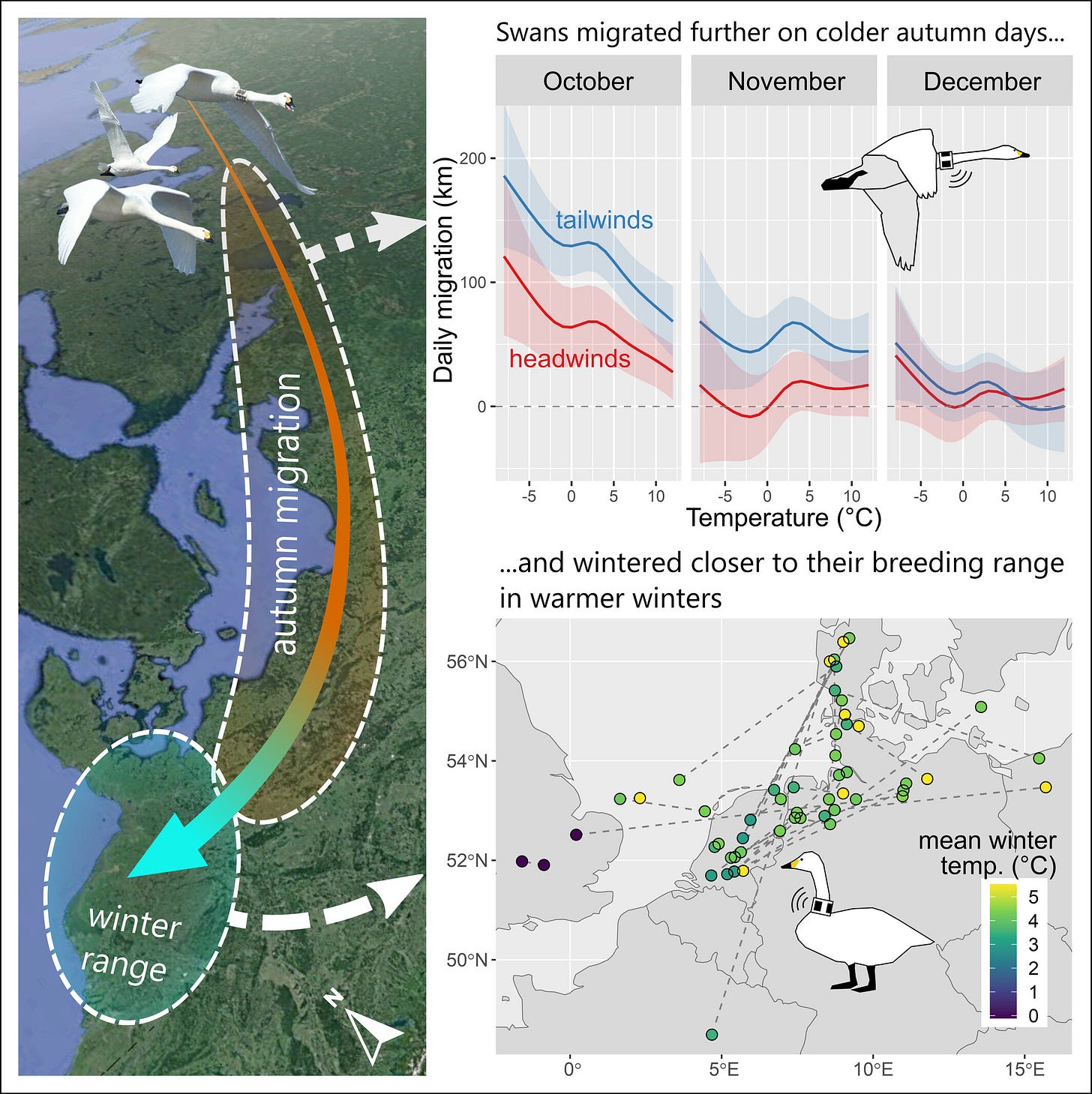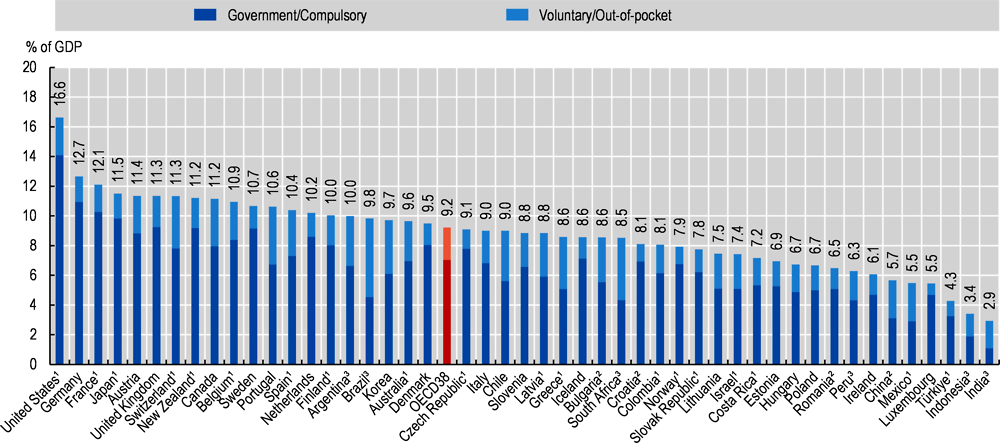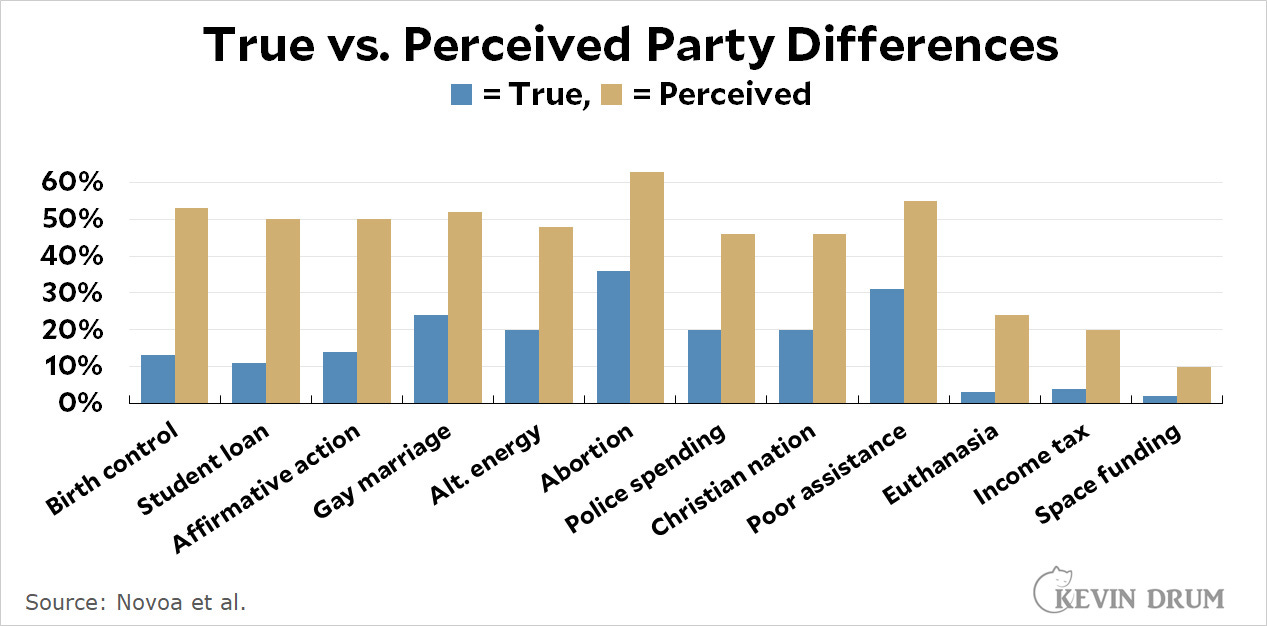Quick Takes and Random Stuff, November 16, 2023
Swans, health care, wind, TikTok, pessimism and more
I’ll take next Thursday off, so a happy Thanksgiving to everyone today. Here is something new this week. If you read below, this partial recap will make sense: We seem to be moving in the direction of trusting TikTok, getting scammed on the internet, but losing trust in scientists. This doesn’t seem good to me, but I’m a smart pessimist.
Graph of the week
This comes from the article Migratory swans individually adjust their autumn migration and winter range to a warming climate (10/5/2023). One interesting thing to note is that this is a compilation of graphs from the article that was in the email alert but not actually in the paper. One interesting point is the fairly consistent gap between the distance traveled with a tailwind as opposed to a headwind. Classroom Connection: Graphs like these are, to me, interesting and informative, but how many people could answer questions about such a graph? I think graphs like this would make great exercises if accompanied with questions to be answered based on reading the graph. Basically, now that graphical information is getting more complex, we should be teaching students how to read such graphs.
Health care spending
This is from the OECD. The U.S. spends way more money on health care than any other country; no surprise there, but what is interesting here is that the amount of Voluntary/Out-of-pocket varies a lot by country. The U.S. is not the highest in the Voluntary/Out-of-pocket category. On the other hand, the Government/Compulsory for the U.S. is higher than the total for all other countries alone. Either way, it seems we should be able to do better.
Misleading headline of the week
This is the headline from a PHYS.ORG article, Heat projected to kill nearly five times more people by 2050 (11/15/2023), and the first paragraph:
Nearly five times more people will likely die due to extreme heat in the coming decades, an international team of experts said Wednesday, warning that without action on climate change the "health of humanity is at grave risk".
It would seem that climate change will be responsible for five times more heat-related deaths. The 5-times number seems to come from this article by Medical Press (11/14/2023), where it says:
Under this scenario, yearly heat-related deaths are projected to increase by 370% by mid-century, with heat exposure expected to increase the hours of potential labor lost globally by 50%.
But in the same article earlier, they note:
Heat-related deaths in people aged over 65 increased by 85% in 2013-2022 compared to 1991-2000, substantially above the 38% increase expected had temperatures not changed (i.e., accounting only for changing demographics).
In other words, increasing deaths due to heat has other variables beyond climate change. I clicked another link in the article that has this title: Temperature-related deaths could rise five-fold by the end of this century in the US (9/7/2023). Focus on the word “could.” A key quote from the article:
If global temperatures warm 3 degrees Celsius (5.4 degrees Fahrenheit) above pre-industrial averages and cities do not expand their existing cooling infrastructure, the United States can expect five times the number of temperature-related deaths per year, a new study finds. Adapting cities to heat, primarily through greatly expanded access to air conditioning in the northern states, could slow that trend by 28%.
and
Population growth and the expanding share of the population age 75 and older drives most of the increase in number of deaths from heat and cold, according to the study, published this week in GeoHealth.
and finally the kicker
The effects of climate change alone contribute little to the overall loss of life from temperature-related health impacts in the United States as a whole—until the 3-degree threshold is crossed.
It seems there is a bit of exaggeration going on in the first article and an assumption that humans won’t adapt in some way. To be clear, I’m not saying climate change is nothing to worry about, but I also want clarity and honesty in reporting, climate change or otherwise.
One last point, Data Rule: Be wary of percentages without counts. If someone is giving you a percentage increase without counts, then that should make you suspicious. The reason is that if the counts are small, then the percentage increases can appear drastic. This is one of those cases. The heat-related deaths in the U.S. in 2022 were 1,714. A five-fold increase by 2050 gives us 8,570. The U.S. is projected to have about 380 million people. In other words, a death rate due to heat of about 0.002%. I don’t want to trivialize death, but based on this projections, heat isn’t going to be a major killer in the U.S.
More on offshore wind
A few quotes from Q&A: As US begins to build offshore wind farms, many doubts remain about impacts on the oceans and marine life (11/15/2023).
For example, offshore wind turbines decrease wind speeds behind them, and the presence of their structures makes the water more turbulent. These changes could affect ocean currents, surface wind speeds and other factors that influence hydrodynamics—the structure and movement of the water around the turbines.
Remember, nothing is free of consequences. If you didn’t read about how whales help sequester carbon in last week’s Quick Takes you should, because we have this from the article:
Right whales are filter feeders that consume huge quantities of tiny zooplankton. The whales need to find large, dense patches of zooplankton at appropriate water depths in order to feed. Altering waves, tides and currents in ways that affect where their prey are located could affect whale feeding or cause the whales to change foraging habitats.
We concluded that it is critical to consistently monitor right whales and their prey within and outside the region, because we don't know whether wind development will cause an increase, a decrease or no change to their zooplankton prey.
It is possible that offshore wind could have a negative impact on right whales, a positive impact, or be neutral. We don’t seem to know for sure yet. But if it is negative, then offshore wind, which is supposed to reduce CO2, would actually be working against itself with a reduced whale population, even if only slightly. There was no mention of this aspect in the article. Again, I’m not saying don’t pursue offshore wind, but I do want to point out that the world is complicated and nothing is for free.
The rise of TikTok
I’m old enough to be a curmudgeon, and I’ll just say that I don’t see this survey from Pew as a good thing. As the world gets more complex, it seems we want news and information to be simpler and catchier. I’ll continue to push against this trend with graphs, data, and nuance.
News from our isolated tribes
Drum puts together this graph (11/14/2023) that shows the perceived differences between parties are much higher than the actual differences.
Drum gives his take on why:
Most likely this is the fault of two things: (a) the media, and (b) thought leaders being more extreme than ordinary voters. If you watch Fox or MSNBC, all you see is the most extreme members of the opposite party, and those people tend to be politicians and professional pundits with militant views.
I agree, but we need to add the overall tribal effect going on in society. I talk about this in W.E.I.R.D and the new kinship. We increasingly don’t interact with people with different viewpoints. This will just reinforce the perceived differences. The media and thought leaders may be pushing the differences narrative, but people are not having this view challenged by sticking to their own tribe.
Pessimist rule
As a pessimist, I fully endorse the article Looking on the (B)right Side of Life: Cognitive Ability and Miscalibrated Financial Expectations (11/10/2023)
All else being equal, those highest on cognitive ability experience a 22% (53.2%) increase in the probability of realism (pessimism) and a 34.8% reduction in optimism compared with those lowest on cognitive ability. This suggests that the negative consequences of an excessively optimistic mindset may, in part, be a side product of the true driver, low cognitive ability.
Internet crime
These two graphs come from the FBI 2017 and 2022 internet crime reports. Apparently, they couldn’t stick with a simple table in 2022. Note that there is no adjustment here for the change in the number of people in an age group. Here are the percent increases in losses for each age group: Under 20: 2445%, 20-29: 464%, 30-39: 732%, 40-49: 554%, 50-59: 553%, and over 60: 805%. All groups range from a 4-fold to an 8-fold increase in losses, except for the under-20 group, which saw a 24-fold increase. This is more than a little concerning.
Trust in science declining
From the Pew article Americans’ Trust in Scientists, Positive Views of Science Continue to Decline (11/14/2023). If society is generally losing trust in higher education, this really should be surprising. Republicans are largely responsible for this, as 38% of them now have little faith in scientists. To me, this is tied to our tribes. Most campuses aren’t welcoming to people with more conservative viewpoints. This sets up the dynamic of faculty mistrusting Republicans, and Republicans view that they aren’t welcome to mistrust faculty. Neither side talks to the other side much. You can’t blame this all on the media and thought leaders.
The spinning CD
Quality rock from Dirty Honey: Won’t Take Me Alive.
Please share and like
Please help me find readers by forwarding this article to your friends (and even those who aren't your friends), sharing this post on social media, and clicking like. If you're on Twitter, you can find me at BriefedByData. If you have any article ideas, feedback, or other views, please email me at briefedbydata@substack.com.
Thank you
In a crowded media market, it's hard to get people to read your work. I have a long way to go, and I want to say thank you to everyone who has helped me find and attract subscribers.
Disagreeing and using comments
I'd rather know the truth and understand the world than always be right. I'm not writing to upset or antagonize anyone on purpose, though I guess that could happen. I welcome dissent and disagreement in the comments. We all should be forced to articulate our viewpoints and change our minds when we need to, but we should also know that we can respectfully disagree and move on. So, if you think something said is wrong or misrepresented, then please share your viewpoint in the comments.











